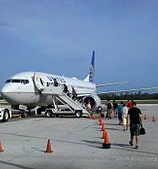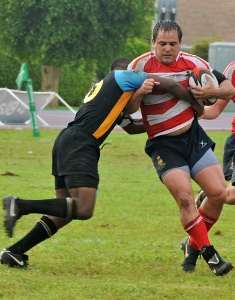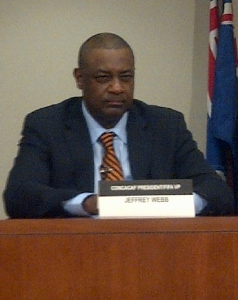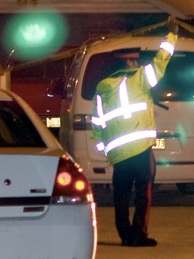Archive for May 29th, 2012

TV company offers reward for conviction of robbers
 (CNS): Cayman’s cable company is offering a $10,000 reward for information leading to an arrest, charge and conviction of any of the men involved last week’s armed robbery. The first ever armed robbery of WestStar is one of ten to take place so far this year in the Cayman Islands. Three masked men armed with guns stormed the television centre and threatened staff and customers in the WestStar customer service office last Thursday afternoon (24 May). This is not the first time a local business has put up a reward for help in solving an armed robbery, but all of the crimes for which rewards were offered remain unsolved.
(CNS): Cayman’s cable company is offering a $10,000 reward for information leading to an arrest, charge and conviction of any of the men involved last week’s armed robbery. The first ever armed robbery of WestStar is one of ten to take place so far this year in the Cayman Islands. Three masked men armed with guns stormed the television centre and threatened staff and customers in the WestStar customer service office last Thursday afternoon (24 May). This is not the first time a local business has put up a reward for help in solving an armed robbery, but all of the crimes for which rewards were offered remain unsolved.
Police are still looking for the television robbers, who were caught on camera. Three men arrested in the wake of the daylight heist were released by police after they were eliminated from the enquiry.
 Detectives are still hoping that the public may be able to offer some information on the getaway car used by the armed masked men. The robbers drove off towards Eastern Avenue after the heist and a short time later police found what they are confident is the getaway car in School Road. The vehicle is a wine coloured Mitsubishi RVR displaying the license plates 101878.
Detectives are still hoping that the public may be able to offer some information on the getaway car used by the armed masked men. The robbers drove off towards Eastern Avenue after the heist and a short time later police found what they are confident is the getaway car in School Road. The vehicle is a wine coloured Mitsubishi RVR displaying the license plates 101878.
Anyone with information on this crime can speak to the Drugs and Serious Crimes Task Force on 949-4222, the RCIPS tip-line 949-7777 or Crime Stoppers on 800-8477(TIPS).
See Cayman 27 video of the robbery here

Auditor revisits Gasboy-gate
 (CNS): The auditor general will be publishing an updated report next week relating to the abuse of government’s Gasboy fuel card system. Alastair Swarbrick has revisited government departments to see what recommendations have been adopted and looked at new case studies to see if better practices are now in place to avoid the risk of misuse of public funds. In the original report Dan Duguay, the previous auditor general, found that some $500,000 could have been fraudulently obtained from government's fuel station in North Sound as almost a third of the transactions reviewed were suspicious. Swarbrick will be revealing the latest findings on Tuesday 5 June, when he will officially release the report which is currently under wraps.
(CNS): The auditor general will be publishing an updated report next week relating to the abuse of government’s Gasboy fuel card system. Alastair Swarbrick has revisited government departments to see what recommendations have been adopted and looked at new case studies to see if better practices are now in place to avoid the risk of misuse of public funds. In the original report Dan Duguay, the previous auditor general, found that some $500,000 could have been fraudulently obtained from government's fuel station in North Sound as almost a third of the transactions reviewed were suspicious. Swarbrick will be revealing the latest findings on Tuesday 5 June, when he will officially release the report which is currently under wraps.
In the first report the Office of the Auditor General (OAG) blew the lid on the potential fraud, which was facilitated by the failure of checks and balances in the card system being used by government employees. With little or no control over the system, Duguay said it had been severely abused, causing significant loss to the government purse. The original audit revealed that a significant number of the cards issued to civil servants to gain access to fuel were being held by people who had even resigned from government.
The potential fraud and abuse of public money came to the attention of the government’s own Internal Audit Unit within the Treasury Department which had examined the five biggest users of government's fuel depot, one of which is the RCIPS. However, this report was not made public until Duguay and his team took up the issue. Duguay said that when he examined this report he found that practically every control in place to monitor usage has been circumvented or inadequately controlled.
The fuel management system used at the Department of Vehicle and Equipment Services is a GASBOY card, which is issued to workers who need to fuel up public vehicles. The audit found that there were 1,600 cards in use at the time or one card for every person working in the public sector. Cards that were active were issued to people who had resigned and there were more than 100 incidences of two or more cards being issued to the same employee.
Management had lost control over who was using the cards and when, Duguay said at the time of the report. "The issue of fuel card distribution indicates a total lack of control and responsibility," Duguay said when he published the controversial report. He pointed to several red flags for that fraud, including multiple transactions on a given card in the space of one hour, as well as purchases on vehicle cards that were in excess of a vehicle's fuel capacity.
Public Works, the National Roads Authority, Environmental Health, Water Authority and the police were the biggest users, accounting for almost three quarters of the fuel consumed by government. At the time Duguay recommended that government take drastic steps to stop this potential for abuse and the current auditor general’s team has revisited these and other agencies in its update to find out what has been done.
During the Public Accounts Committee hearing that took place to examine Duguay’s report many of the witnesses representing the government departments denied the suggestion of fraud or misuse.
Police Commissioner David Baines, however, admitted that a criminal investigation was on-going regarding the abuse of the fuel cards while denying that there was significant abuse by RCIPS officers. He told thecommittee in May 2010 that detectives were following up on transactions made on one card in particular, but the police boss suggested the problem was poor management of the system and not that fuel had been obtained fraudulently.
Nevertheless, Baines conceded that he did not have enough officers to investigate the numerous transactions that were considered suspicious and no update has been supplied to the public regarding the investigation.
See original report below and be sure to check CNS next Tuesday for the auditor general’s latest findings.

Minister remains silent on DUI charges
(CNS): The education minister refused to make any comment Monday regarding his arrest last week and the charges he now faces for DUI. Rolston Anglin said that the issue was now in the court system and it would not be appropriate for him to comment on what had happened. He said that he did not believe that it would hinder his position as education minister, even though Cayman is approaching graduation season when it is customary for the minister to appear at the ceremonies and offer inspiration and leadership to the country’s young graduates when he makes his addresses to the students.
Anglin was involved in a single vehicle smash on the West Bay Road in the early hours of Wednesday 23 May, though no one was hurt when the car ran into a ditch near to the Avalon apartment complex. After being charged with Driving Under the Influence, Anglin was released on police bail.
Details of how much the minister was over the limit have not been released but the Cayman Islands already has one of the more generous legal limits in the world at 100 milligrams of alcohol per 100 millilitres of blood, compared to 80 milligrams in the UK, the US and Jamaica, while it is 50 across the rest of Europe and in Canada.
Police have been attempting to clamp down on what they described as an endemic problem. At the end of last year, during the seasonal road safety campaign, operation Christmas Cracker, senior police officers said they were outraged at the number of people who ignore the drink-driving laws
“Forty-four people who thought that the traffic law did not apply to them are facing court in the New Year,” said Chief inspector Angelique Howell at the end of December. “The figure is deplorable and a sad indictment on the behaviour of drivers in the Cayman Islands.”
She described drunk drivers as selfish and irresponsible people who continue to put their own lives and the lives of other road users at risk.

April brings disappointing fall in tourism arrivals
 (CNS Business): Following more than a year of growth in air arrivals, April statistics showed a disappointing fall in the number of passengers flying into the Cayman Islands. Although the constant growth in the passenger figures for the airport was interrupted by a dip of 0.4% this January, a decline of 2.6% in April represents a more significant decline. However, 30,027 people still flew into Cayman last month which, 2011 aside, is the best April since 2004. Cruise arrivals also experienced a slight fall last month following an optimistic start to 2012 for the cruise tourism sector. April saw 145,798 passengers visit Grand Cayman this year compared to 146,829 last hear, which is the lowest arrival numbers for the month since 2002. Read more on CNS business
(CNS Business): Following more than a year of growth in air arrivals, April statistics showed a disappointing fall in the number of passengers flying into the Cayman Islands. Although the constant growth in the passenger figures for the airport was interrupted by a dip of 0.4% this January, a decline of 2.6% in April represents a more significant decline. However, 30,027 people still flew into Cayman last month which, 2011 aside, is the best April since 2004. Cruise arrivals also experienced a slight fall last month following an optimistic start to 2012 for the cruise tourism sector. April saw 145,798 passengers visit Grand Cayman this year compared to 146,829 last hear, which is the lowest arrival numbers for the month since 2002. Read more on CNS business

Cayman rises in world rankings
 (CRFU): The Cayman National XV men’s team put their recent 4 point loss to Bermuda firmly behind them with a resounding 20 point win over the Bahamas on 26 May at the Truman Bodden Sports Complex at “BIG GAME 2”. Cayman took time to get their game flowing against a dogged defensive performance from the Bahamas for the first 40 minutes in front of an estimated 1500 people. A lone Morgan Hayward penalty kick was the only score separating the two teams after 40 minutes in what looked to building towards a mirror image of the Bermuda game played only the week before. Half Time Cayman 3-0 Bahamas. Photos Caroline Deegan
(CRFU): The Cayman National XV men’s team put their recent 4 point loss to Bermuda firmly behind them with a resounding 20 point win over the Bahamas on 26 May at the Truman Bodden Sports Complex at “BIG GAME 2”. Cayman took time to get their game flowing against a dogged defensive performance from the Bahamas for the first 40 minutes in front of an estimated 1500 people. A lone Morgan Hayward penalty kick was the only score separating the two teams after 40 minutes in what looked to building towards a mirror image of the Bermuda game played only the week before. Half Time Cayman 3-0 Bahamas. Photos Caroline Deegan
A converted Ben Blair drive over try from a Cayman lineout secured by Cayman lock Yohann Regnard gave Cayman some much needed breathing room to take the game to 10-0 and Cayman’s opening try started a flow of points for the local boys which featured a Vanassio Tokotokovanua try and 2 Robbie Cribb tries to earn Cayman not only a win but a much needed bonus point.
Bahamas earned a consolation try with the final play of the game when powerful no. 8 Devon Woodside crossed the line to ring in the final whistle in front of a jubilant home crowd.
 Final Score Cayman 27-7 Bahamas
Final Score Cayman 27-7 Bahamas
The bonus point win over the Bahamas and the bonus point loss against Bermuda puts Cayman in a strong position going into the 9 June clash between Bahamas and Bermuda and whilst the defensively weak 2nd half performance by the Bahamas will raise doubts that the Bahamas will be successful at home against the current Caribbean champs Cayman will be cheering on Bahamas in their next venture. Should Bahamas lose to Bermuda the Cayman National XV’s Caribbean Champs and World Cup Qualification process will be over.
The win over the Bahamas sees Cayman leapfrog Barbados and Singapore in the IRB world rankings to 66 and secures Cayman’s position as the 4th highest ranked Caribbean Nation behind Trinidad and Tobago, Bermuda and Guyana.
Should Bahamas beat Bermuda and the Cayman Men’s XV progress to their 2nd Caribbean Championship Final they will likely meet either Guyana or Trinidad and Tobago away on 23 June.
Photos: Top left: Phil Fourie made some great ball carries for Cayman
Middle right: The first half of the game saw lots of scrums due to handling errors

Health officials urge cancer patients to join register
 (CNS): Patients who are being treated for cancer are being encouraged to supply information with the national Cancer Registry which was launched in 2010 by the Health Services Authority in collaboration with the Cayman Islands Cancer Society. Officials say that there is a need for accurate data to inform on trends in cancer incidence along with outcomes and quality of care. Currently, it is not mandatory for those with cancer to submit details to the registry and Cancer Registrar, Milena Conolly said that there is not enough data on the disease. “There is very little information on the number of people living with cancer or the types of cancer that are most prevalent in the Cayman Islands at present,” she said.
(CNS): Patients who are being treated for cancer are being encouraged to supply information with the national Cancer Registry which was launched in 2010 by the Health Services Authority in collaboration with the Cayman Islands Cancer Society. Officials say that there is a need for accurate data to inform on trends in cancer incidence along with outcomes and quality of care. Currently, it is not mandatory for those with cancer to submit details to the registry and Cancer Registrar, Milena Conolly said that there is not enough data on the disease. “There is very little information on the number of people living with cancer or the types of cancer that are most prevalent in the Cayman Islands at present,” she said.
“We need to know information such as the number of new cases that develop annually, the treatments and outcomes.”
Jennifer Webber, Operations Manager for the society urged people to come forward and register. “With the widening impact of cancer on the Cayman Islands community and the escalating complexity and expenses associated with treatment, accurate statistics are needed to inform the public, create healthcare policies and present actionable steps toward prevention and the reduction of cancer risks,” she said.
Conolly spoke about the important of understanding changes and developments that while help create an accurate picture of cancer incidence in the population so that interventions can be targeted. “This information can then be used to make informed public health decisions and act as a catalyst for the development of programmes designed to mitigate the risks of many types of cancers,” she said. “Data collected by the Cancer Registry can be compared with other Caribbean countries and worldwide. This comparison will give the Cayman Islands evidence of any similarities or differences experienced.
“The ability to compare data will encourage collaboration with other nations and further research. Without this information it would be difficult to initiate action to decrease the occurrence of cancer in the Cayman Islands.”
Cancer registries have proven to be key components of a knowledge management system for cancer. They contribute to scientific research into causes and cancer management. Registries also provide evidence for policymaking and the monitoring of programme implementation.
National Cancer registries aim to collect data on every case of cancer diagnosed in all persons residing within the geographical area they cover.
Speaking about the local register health minister Mark Scotland said itwas a toll which one day would be able to provide accurate survival information. “he accumulated data will also prove very useful in assisting us in making important public health decisions that maximize the effectiveness of our public health funds – such as the placement of screening programmes. We encourage all individuals and health care agencies to participate along with them in this important initiative,” he added.
More information on the registry, including the physician or personal reporting forms, can be found at www.cics.ky/registry.php or www.hsa.ky/cancer_registry.html. Alternatively, to learn more about the registry contact the Cancer Registrar, Milena Conolly at 244-2560 or email at cancerregistrar@hsa.ky

US visitor dies snorkelling in East End
(CNS): Updated – Police have named the American tourist who died Sunday morning while snorkelling in East End. He was 56-year-old Kenneth Perroz of Tampa, Florida, who was visiting Grand Cayman. He was found unconscious in the sea close to the Morritts Tortuga resort at around 10:00am yesterday morning (27 May). According to the police report, Perroz had been snorkelling with a friend but the two swimmers were separated. Perroz' friend got out of the water but returned to try and find his snorkelling partner but was unable to locate the 56-year-old. A short time later the Tampa man was found unconscious and floating on the water. Perroz was brought to shore and his friend administered CPR until the arrival of paramedics.
He was taken to the Cayman Islands Hospital, George Town, but he was pronounced dead on arrival.

Compliance pension law focus
 (CNS): Ensuring that employers comply with the pensions law is one of the major focuses of new legislation dealing with private sector workers’ pensions. The first major re-drafting of the law since it was passed in the 1990s, the minister for employment revealed the proposed bill on Monday and asked for public participation. The law also provides for the split of oversight between CIMA, which will now regulate the pension funds, and the new Department of Labour and Pensions, which will ensure employer compliance. The law does away with the National Pensions Board and introduces a fixed penaltyregime and direct consequences for employers who fail to follow the law.
(CNS): Ensuring that employers comply with the pensions law is one of the major focuses of new legislation dealing with private sector workers’ pensions. The first major re-drafting of the law since it was passed in the 1990s, the minister for employment revealed the proposed bill on Monday and asked for public participation. The law also provides for the split of oversight between CIMA, which will now regulate the pension funds, and the new Department of Labour and Pensions, which will ensure employer compliance. The law does away with the National Pensions Board and introduces a fixed penaltyregime and direct consequences for employers who fail to follow the law.
Officials also said that the new law provides greater transparency for employees, or members of the pension funds, and requires funds to issue quarterly statements as well as host annual meetings for workers to question and probe those responsible for managing their retirement money. It also obligates funds to tell employees, and not just the labour department, when employers are delinquent with contributions and will also require employers to keep pension records for seven years on every employee.
The ministry has launched a comprehensive survey which provides for comments on the main areas of the bill. Over the next month oficials will engage in a wide consultation of the law before it is brought to parliament for debate. Speaking at a press briefing on Monday, Minister Rolston Anglin said he believed the bill "was going to go a long way to creating a culture of compliance and to make sure workers' money is protected.”
With hundreds of non-compliant cases, the minister said it was clear that the previous regime was not working and improvements were needed. “When we have a situation with 600 cases in a backlog of non-compliant employers, we knew we had to act and we needed to act in a way that was reasonable. Government must take a leading role in ensuring Caymanians are better prepared for their retirement after a lifetime of hard work,” Anglin said,
He added that the United Democratic Party had campaigned on a commitment to examine and revise work related matters and there was nothing that strikes more to the core of work than pensions. “After a long career, if our people can't retire with dignity then they will ask what the life-long hard work was for,” he added.
Anglin said the new law would enhance pension protection and the plans themselves, as well as introduce an improved regime of regulation and transparency. But above all, he said, it was about developing a culture of compliance among employers and employees.
Explaining the decision to split the regulation of the plans themselves from the compliance of the employers as well as the elimination of the National Pensions Board, Anglin said that CIMA was already resourced to oversee and regulate pensions as it could be absorbed into the department that currently regulates insurance.
The minister said it would have been a costly exercise to create an internal regulator for the funds themselves inside the labour department. With the department now focused on compliance and enforcement, it will be issuing the fixed penalties and ensuring that businesses that are not compliant do not receive a Trade and Business license, which would in turn prevent them from getting work permits.
Those employers who dispute their fixed penalties will need to challenge the fine in the court and employees who believe their bosses are not compliant can complain directly to the labour department.
The minister explained that this is all an administrative function and there is no longer a need for a politically appointed board to deal with the country’s workforce pension regime. He pointed out that there are no other circumstances where a board manages a government department but that the role of boards was confined to government companies or statutory authorities.
Anglin also revealed that the normal retirement age is moving to 65, which will mean employers will be required to continue paying into their worker’s pension funds until that age. But, the minister said, there would be a three year transition period to allow people who are nearing 60 to still allow them to end their careers at that point if they wish.
Go to government survey and details of the legislative changes here
See draft legislation and notes on the law here
Check back to CNS on more stories regarding private sector pensions this week.

Webb: Cayman must be ready to meet opportunities
 (CNS): The historic election of local football boss Jeff Webb as president of CONCACAF presents not just a great opportunity for him and local football but for the entire Cayman Islands. Webb will be opening a confederation office here shortly and this summer he will be hosting an executive committee retreat in order for the football administrators to develop a strategy for regional football. Webb said this was just the first of what would be many meetings or football related events and even major tournaments that could be hosted in Cayman. But he said it would require investment in infrastructure to meet the demands of hosting large scale games and major conferences on the island.
(CNS): The historic election of local football boss Jeff Webb as president of CONCACAF presents not just a great opportunity for him and local football but for the entire Cayman Islands. Webb will be opening a confederation office here shortly and this summer he will be hosting an executive committee retreat in order for the football administrators to develop a strategy for regional football. Webb said this was just the first of what would be many meetings or football related events and even major tournaments that could be hosted in Cayman. But he said it would require investment in infrastructure to meet the demands of hosting large scale games and major conferences on the island.
Given the size of the association that Webb now heads up, holding a conference or tournament here could fill every room in Cayman, which means that there will need to be some expansion and development of local resources if the country is to take advantage of the access it will now have. Webb said he believed the Cayman Islands could be the perfect venue for a beach football tournament as well as offering an ideal location for football training camps for regional teams.
“The opportunities will come for Cayman because of the access we now have but we have got to be ready to meet those opportunities with the necessary level of resources and infrastructure,” he said at a press briefing Monday, hosted by Sports Minister Mark Scotland. Webb explained that his appointment created access and placed Cayman in a unique position, from a footballing stand point, that could be huge for Cayman’s future economy.
The new CONCACAF president was elected to the region’shighest footballing post at a meeting in Budapest, when the scale of the financial and other challenges also emerged following the revelations of an audit into the association.
Webb said there was a lot of hard work ahead but he intended to switch the focus back to the players as they were the heart of the game. His goal, he said, was to create grassroots and elite player programmes to nurture regional footballing talent. He said there were significant resources among the more than forty member countries that could help improve the game. With giant members such as Mexico, the United States and Canada, he said CONCACAF had access to resources that had not been properly exploited.
Congratulating him on his election, Scotland described the appointment as mind boggling. With Canover Watson appointed to the executive and Bruce Blake also taking up a senior post in the Caribbean Football Union, the minister said it illustrated the high regard held for Cayman’s administrators.
Scotland said Webb’s election was no accident because he was arguably the best football administrator in the Caribbean and was dedicated to raising standards in the game. He said it was no small achievement for Webb to be elected to such a high position given the size of the Cayman Islands, but no surprise as he had taken the initiative and the lead to deal with the body’s challenges in the immediate wake of CONCACAF’s corruption allegations as head of the normalization committee. In Hungary, Scotland said, he witnessed the respect and admiration Webb has among his peers from over 200 nations.
Scotland said that football was already growing in the Cayman Islands but now the benefits to the local game would be tremendous.
Bruce Blake, general secretary of the Cayman Islands Football Association, echoed Webb’s sentiments about the need to develop local infrastructure to meet the opportunities that Cayman now had the chance to grasp as a result of Webb’s election.
“We need to be ready to take advantage of this,” he said. “We are now at the forefront of football and we will be hosting courses, conferences and receiving teams. We will need to take services to next level and make sure we are the best as that’s what visitors will expect when they come to events here.”

Communities key to crime reduction, says expert
 (CNS): There is a need for stronger community commitment in order to help reduce the levels and impact of violent crime in the region, Professor Anthony Harriott, Director of the University of the West Indies Institute of Criminal Justice and Security said in Cayman last week. The crime expert said that where there was strong community cohesion there was more informal control over crime. Speaking at a regional bank conference he told the audience that a shift was required across regional communities away from the idea that security is the responsibility of the authorities alone. But he also pointed to a need to tackle corruption among police and politicians before wider crime could be addressed.
(CNS): There is a need for stronger community commitment in order to help reduce the levels and impact of violent crime in the region, Professor Anthony Harriott, Director of the University of the West Indies Institute of Criminal Justice and Security said in Cayman last week. The crime expert said that where there was strong community cohesion there was more informal control over crime. Speaking at a regional bank conference he told the audience that a shift was required across regional communities away from the idea that security is the responsibility of the authorities alone. But he also pointed to a need to tackle corruption among police and politicians before wider crime could be addressed.
He said ordinary people express deep concerns about crime as well as politicians and business people but dealing with the issue at a policing level alone would not reduce crime rates. Professor Harriott, who is also a head of department at the Caribbean Development Bank, was speaking at the annual governors meeting when he said tackling crime required a concerted public effort as well as from the authorities. But the expert warned that a pre-requisite for reducing crime was anti-corruption efforts.
“The big problem in the Caribbean region is violent crime,” he said. “Recent reports, including a World Bank report, have noted that the Caribbean ranks number two in the world as a region when it comes to social criminal violence, so we have a very serious and very difficult problem.”
Taking his statistics from a recent study by the United Nations Development programme entitled: Caribbean Human Development Report: Human Development and the Shift to Better Citizen Security, Prof Harriett said crime was a critical social problem.
While it had been recognised as retarding economic growth, making life difficult for people, creating a loss of confidence in Caribbean countries leading to migration, the professor said what was also important was that the region’s general populations recognised this in some instances as the highest ranking social problem even in the context of a deep economic crisis.
“It’s not just the elite and the academics who are saying this, it is the general population of the Caribbean who are saying that this warrants close attention by our governments and regional institutions,” he said.
According to the report, the Caribbean and Latin America is home to 8.5 percent of the world’s population, yet it concentrates some 27 percent of the world’s homicides.
The increasedprevalence of gang crime in the region had caused the occurrence of violent crime to increase, the professor said. 13 per cent of the 12,000 people from seven Caribbean countries who responded to the survey on which the report was based confirmed that gangs were in their neighbourhood.
“The evidence shows that where gangs exist there is a dramatic increase in victimisation rates for different crimes. In most cases where gangs exist it increases the victimisation rate by 100 per cent,” said Harriott. “This is a central issue for Caribbean countries.”
Research showed that risk factors associated with joining gangs in the Caribbean included poor school achievement and commitment, where parents favoured anti-social behavior, “a robust risk factor for people getting into gangs”, as well as associating with anti-social peers, he added.
Community was very important because it offered opportunities for informal control of young people and put pressure on delinquent youth to avoid gang activity and gang involvement. Availability of guns was another risk factor. Young people’s sense of belonging to their community and country was also very important as was whether they believed others in their community respected them and whether there were channels of participation within these communities as well as at a national level, Professor Harriott explained
“Where we have strong community cohesion you tend to have some informal control. For a lot of intervention efforts these initiatives are likely to succeed where there is involvement from the community,” he said. “Co-production of security is an important shift that needs to be made within the community, away fromthe traditional notion that security is solely the responsibility of enforcement professionals.”
Jamaica, the professor said, had actually managed to reduce its homicide rates by 30 per cent by introducing a robust gang reduction strategy. The Jamaica success had been as a result of obtaining social and political consensus, the first time he had ever seen such agreement in his lifetime. “I think it succeeded because suppression was coupled with alternatives being offered to young people. There were some important community based initiatives, interventions centred on work for young people. I believe that helped to make law enforcement more effective,” the professor added.
International intervention was also important for Jamaica’s success because high end crime was a trans-national and a regional phenomenon. “We need to cooperate at a regional and international level if we are to make an important dent in the problem,” he said. Anti-corruption efforts were a condition of success and anti-corruption efforts, aimed at the law enforcement agencies and the political system were very important for progress, he warned.
Echoing Professor Harriott’s comments, the report found that “alarm raised by increase in crime levels in the Caribbean has often led to short-sighted, mano dura (iron fist) policies, which have proven ineffective and, at times, detrimental to the rule of law…A key message of the report is that Caribbean countries need to focus on a model of security based on the human development approach, whereby citizen security is paramount, rather than on the traditional state security model, whereby the protection of the state is the chief aim. Indeed, the contrast between prevention on the one hand and repression and coercion on the other is ill conceived.”
Social inclusion to help prevent crime and violence and efficient and effective law enforcement were by no means incompatible or mutually exclusive, it went on to say.
“In a truly democratic society, broad based social inclusion and swift criminal justice–or “prevention” and “coercion”—serve to reinforce and complement each other. This is one of the most important lessons to be taken from this report – and not only for the Caribbean but for all of Latin America as well,” the report said.